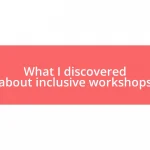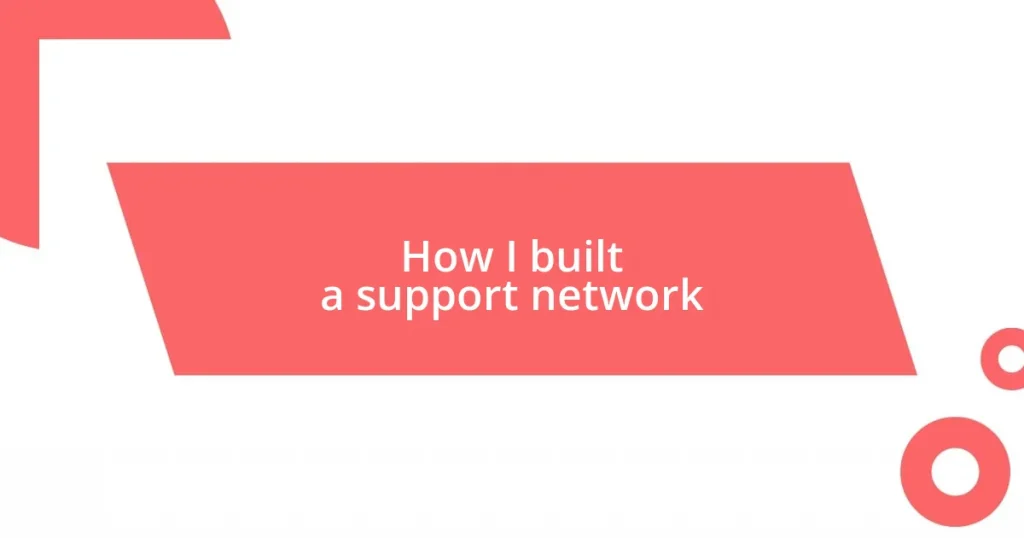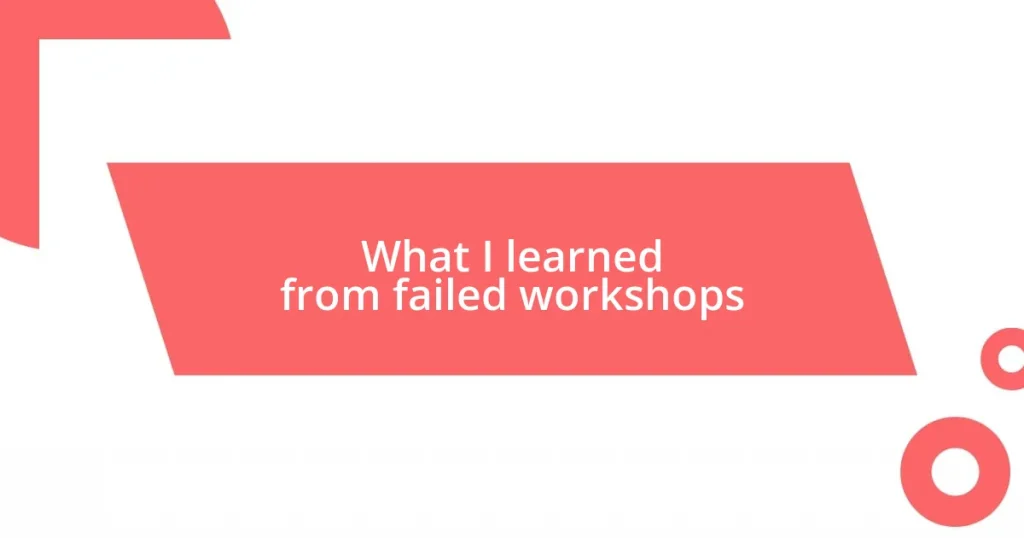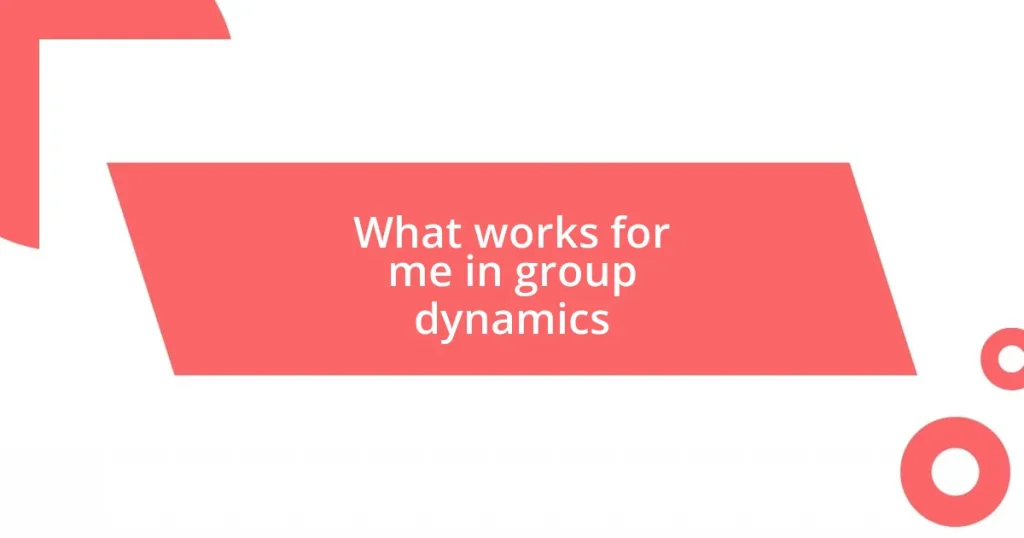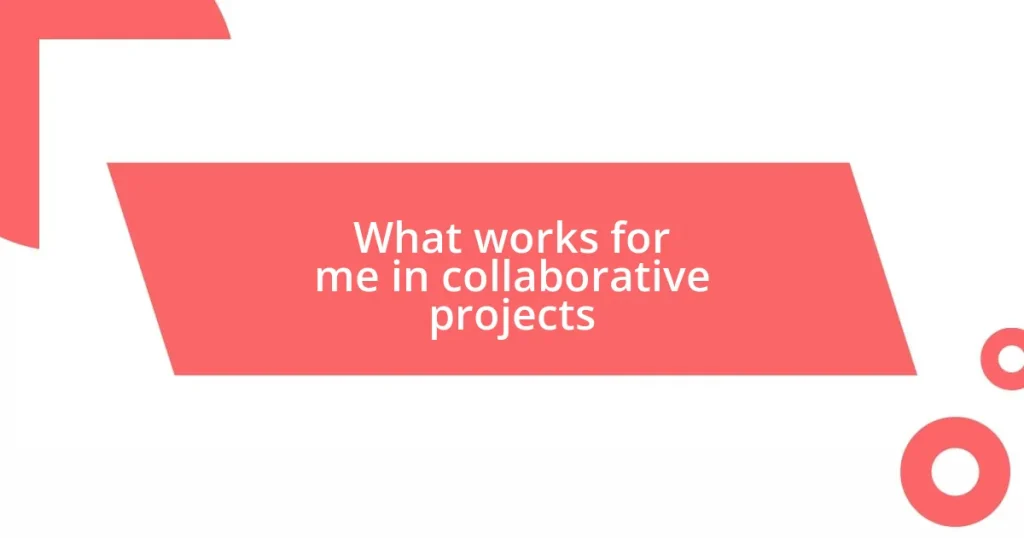Key takeaways:
- Support is a fundamental human need, essential for navigating life’s challenges, and seeking help is not a sign of weakness.
- Building a support network involves identifying various sources of support, including friends, colleagues, and online communities.
- Effective communication and nurturing relationships through regular interactions strengthen bonds and promote mutual support.
- Leveraging online platforms helps create meaningful connections and allows for sharing experiences and resources across distances.
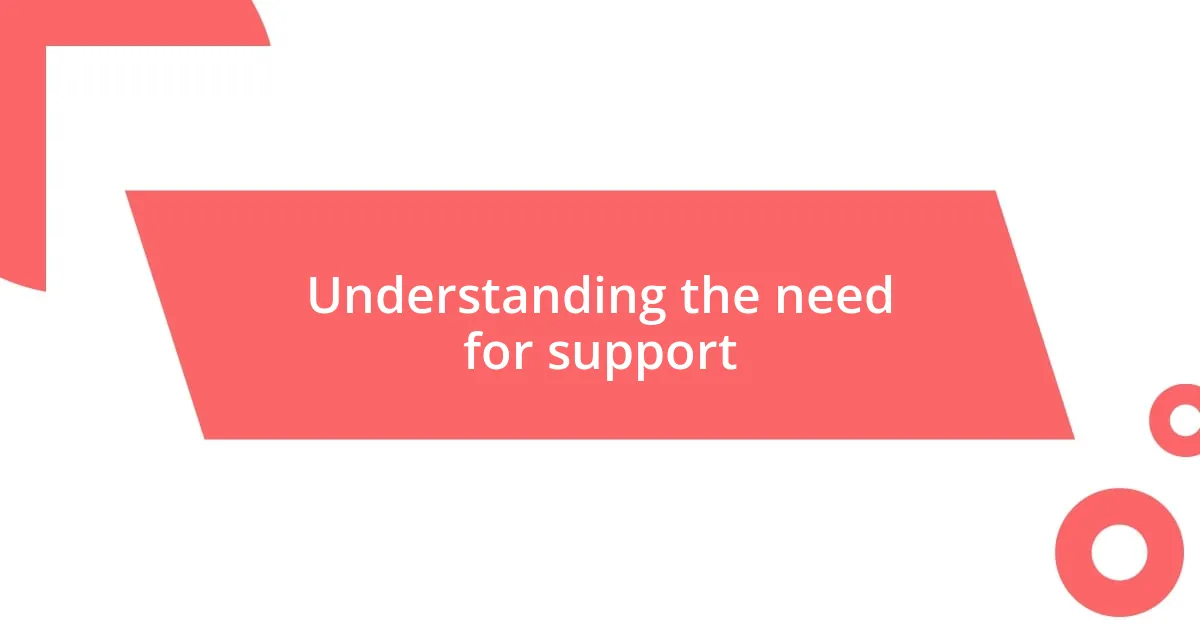
Understanding the need for support
Support is not just a luxury; it’s a fundamental human need. I remember a time when I was juggling multiple responsibilities—work, family, and personal challenges—and felt completely overwhelmed. I began to realize that having a solid support network was essential for navigating those tough moments. Without it, I felt isolated, and those feelings only compounded the stress.
Sometimes, it can be really hard to reach out. Have you ever felt like you should handle everything on your own? I’ve been there. It took me a while to understand that seeking help didn’t signify weakness but rather a recognition of our shared human experience. I found great comfort in sharing my struggles with close friends who empathized, providing me with insight and encouragement I hadn’t anticipated.
Moreover, support goes beyond just emotional backing; it’s about creating a safe space where vulnerability is welcomed. For instance, when I faced a significant life decision, I gathered a trusted group of friends to share my thoughts. Their diverse perspectives opened my eyes to options I had never considered. In those moments, I caught a glimpse of the power that comes from community—like a safety net where ideas and fears can be exchanged freely, reminding me that I wasn’t alone in the journey.
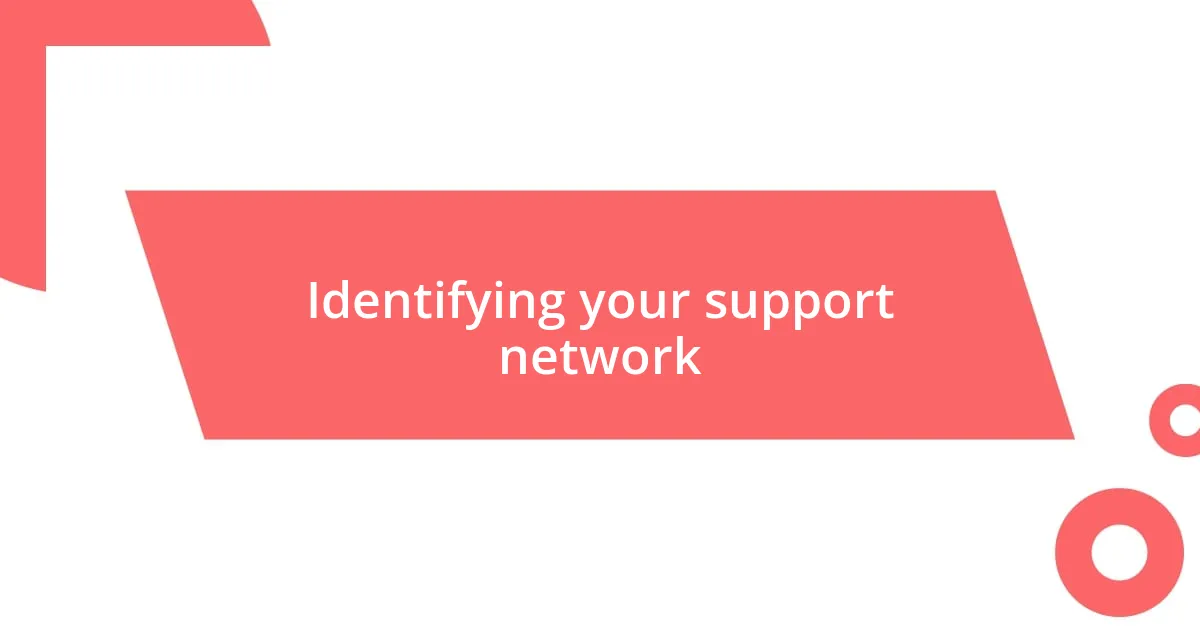
Identifying your support network
Identifying your support network requires a thoughtful examination of the people in your life. I often think about the friends and family members who have consistently been there for me. Recognizing them involved reflecting on past experiences—who did I reach out to during my toughest days? Their names and faces became clear, and I realized just how much they helped me weather life’s storms.
As I dug deeper, I also discovered unexpected sources of support. Some colleagues became confidants, offering advice during overwhelming work situations. Even acquaintances I had only sparingly interacted with turned out to be incredibly supportive during my transition periods. It amazed me how broad the definition of a support network can be; it’s not just your closest friends, but a tapestry of connections built through shared experiences.
To help visualize the elements of your support network, consider this table that breaks it down into different categories. This way, you can easily identify who fits where in your life.
| Type of Support | Examples |
|---|---|
| Emotional | Close friends, family |
| Practical | Colleagues, neighbors |
| Advisory | Mentors, coaches |
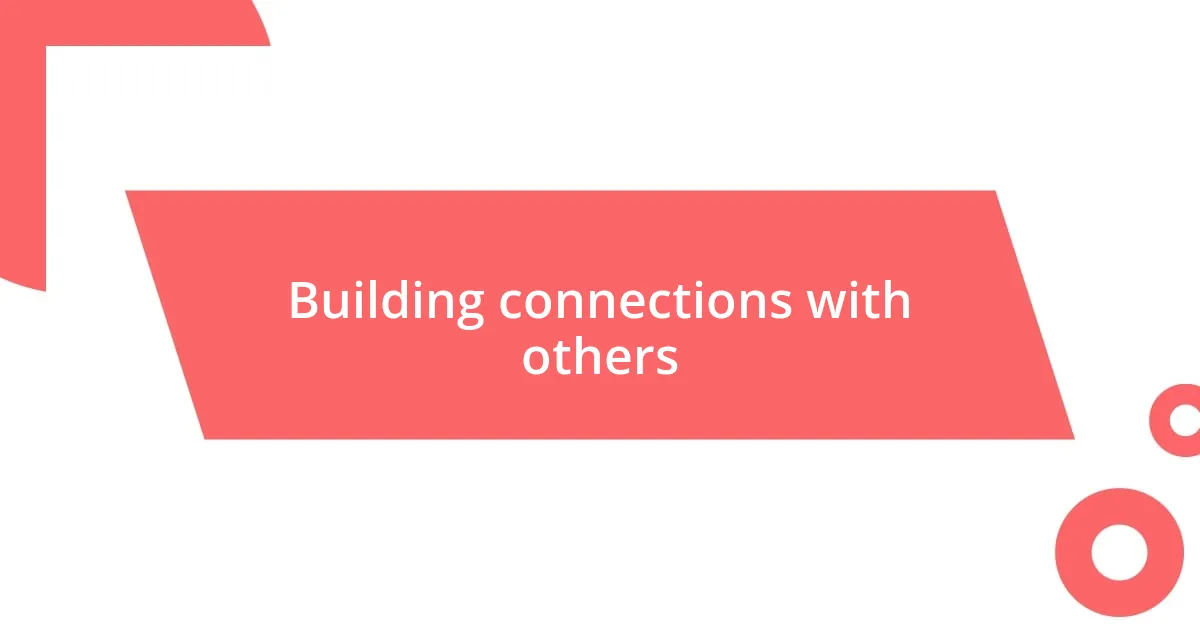
Building connections with others
Building connections with others is essential for a support network to thrive. I recall a time when I attended a community workshop on a topic I was passionate about. There, I met individuals with similar interests who instantly sparked meaningful conversations. This chance encounter led to ongoing relationships that have enriched my life in unexpected ways, reminding me that sometimes the strongest bonds form outside of our usual circles.
To foster these connections, I started embracing vulnerability and openness when interacting with others. After all, it’s the authentic exchanges that create lasting ties. Here are a few strategies I found effective when building connections:
- Engage in shared activities: Join clubs or volunteer groups related to your interests.
- Be approachable: Smile and show genuine curiosity about others’ experiences.
- Share your story: Open up about your challenges and triumphs; people resonate with authenticity.
- Follow up: After initial meetings, reach out to maintain the conversation and deepen the connection.
- Listen actively: Show that you value others’ thoughts and feelings, creating a reciprocal bond.
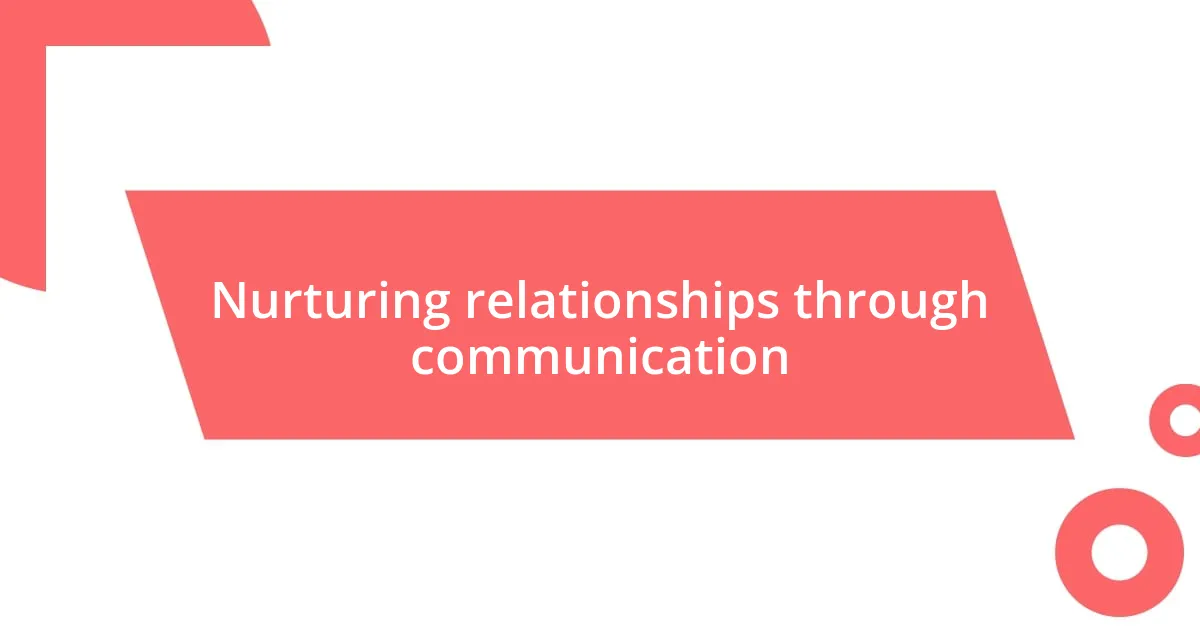
Nurturing relationships through communication
Nurturing relationships through communication is all about being intentional and active in our interactions. I remember a time when I felt distant from a close friend; we had become busy with our lives, and our conversations dwindled to occasional texts. I decided to initiate a weekly video call, and it was transformative. We not only caught up but dived deep into discussions that reignited our friendship. Isn’t it interesting how a small commitment to regular communication can strengthen bonds that might otherwise fade?
I’ve also learned that effective communication requires not just talking but also truly listening. There was an instance when a colleague opened up about a personal struggle during a simple lunch break. Instead of offering solutions, I focused on actively listening, which allowed them to feel heard and valued. I realized that sometimes, people just need a safe space to express themselves. Have you ever noticed how a simple nod or a thoughtful question can deepen a conversation?
Additionally, I’ve found that showing appreciation is a powerful form of communication. After a supportive conversation with my sister, I made it a point to thank her for being there for me. It led to her sharing her own experiences, reinforcing our bond. Recognizing each other’s efforts in supporting one another truly nurtures our relationships and encourages ongoing dialogue. Isn’t it rewarding to feel seen and valued within your support network?
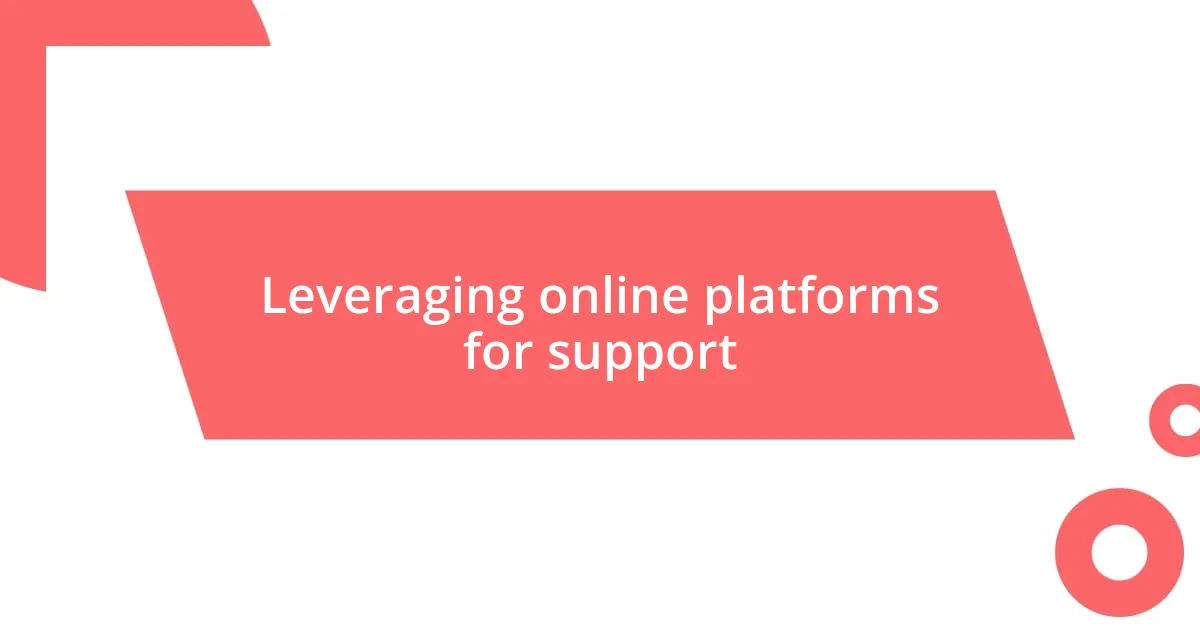
Leveraging online platforms for support
Leveraging online platforms for support has been a game-changer in my journey. I once joined an online forum dedicated to mental health, where I found a space populated by individuals sharing their stories and struggles. It was incredibly comforting to interact with people who truly understood my experiences. I still remember the day someone responded to my post with a simple, “You’re not alone in this.” That message resonated deeply with me, reminding me that connection can transcend physical boundaries.
Social media, too, has played a pivotal role in building my support network. One evening, feeling a bit lost, I posted a vulnerable update about my journey. The outpouring of support from friends and even acquaintances was overwhelming. People I hadn’t spoken to in years reached out, sharing their own experiences and offering encouragement. It struck me how a few clicks could bridge gaps and rekindle old friendships. Have you explored how virtual platforms might facilitate unexpected connections in your life?
I also learned that joining specialized online communities can lead to incredible support. For instance, I signed up for a webinar on personal development and ended up in a breakout room with an inspiring group of people. We exchanged contact information and soon created a group chat where we share resources and celebrate each other’s wins. Isn’t it fantastic how the digital world can foster genuine relationships, allowing us to unite with others in pursuit of personal growth and well-being?
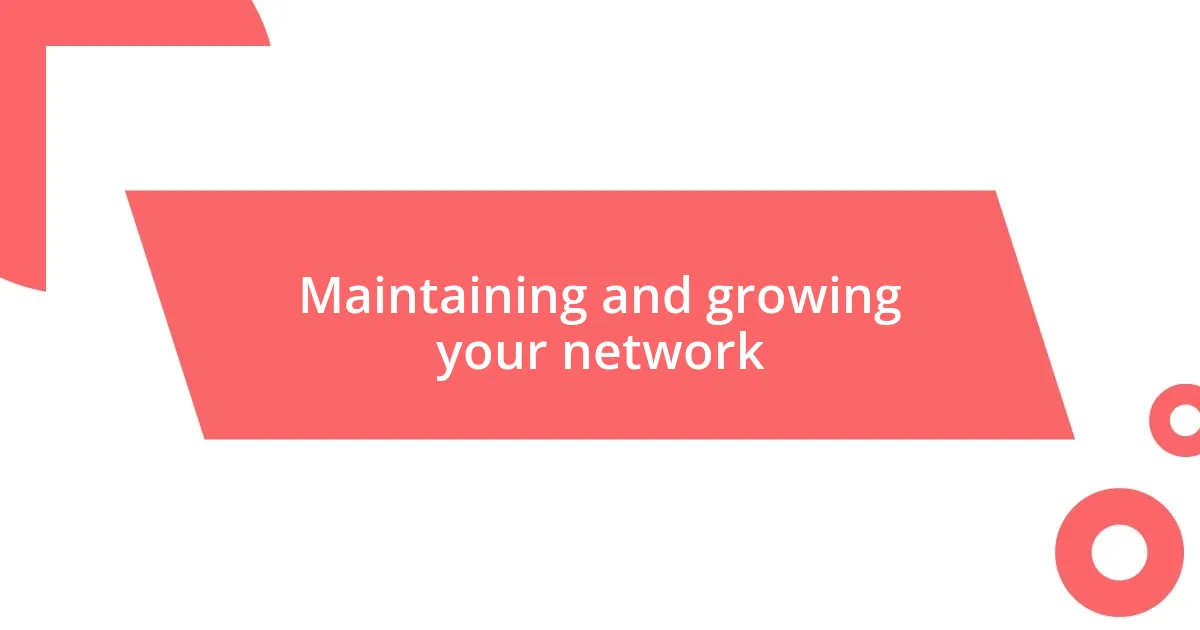
Maintaining and growing your network
Maintaining and growing your network often comes down to consistency and genuine interest. I recall reaching out to an old mentor after several months of being too caught up in my own projects. I asked how she was doing and shared a bit about my current journey. Her enthusiasm in response reminded me how little gestures can keep connections alive and make others feel valued. Have you ever thought about who might appreciate a simple check-in?
Moreover, attending networking events, both online and in-person, can create invaluable opportunities for growth. I attended a local workshop a few months back, where I met a fellow participant who shared my passion for community service. After the event, we decided to collaborate on a project, which not only strengthened our bond but also expanded our respective networks. It felt incredible to see how one event sparked a partnership. Isn’t it exciting how chance encounters can evolve into something meaningful?
As I continued to expand my network, I realized the importance of giving back. I’ve found that mentoring someone new can be particularly rewarding. For instance, I recently helped a junior colleague navigate their first big presentation. Watching them succeed not only filled me with pride but also solidified our connection. Giving support often creates a ripple effect, nurturing both your network and your personal growth. How often do you seek opportunities to uplift others in your circle?





